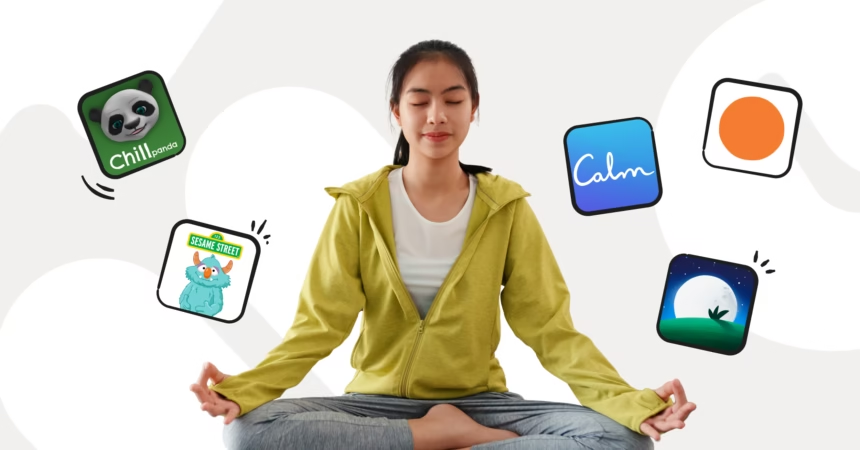Finding a mental health app that truly helps can feel like sorting laundry in the dark. You download, you tap around, then you forget it even exists. This guide fixes that. It’s updated for 2025 and highlights eight Mental Health Apps that are simple, proven, and respectful of your privacy.
You’ll see picks for calm and sleep, daily mindfulness, CBT skills, coaching, mood tracking, and habit building. Each one is tested for real-life use and steady results. Apps can support wellbeing, but they don’t replace professional care or crisis help. If you need urgent support, contact local crisis services. Ready to try one this week?
How We Tested and Ranked the Best Mental Health Apps in 2025
We used these apps like real people do, not just for a day. We checked daily routines, short sessions, and longer programs. We noted ease of use, value for money, content quality, and privacy controls. We also reviewed user feedback and looked for evidence-based methods such as mindfulness and CBT. Only apps that held up in 2025 updates made this list.
What “works” means in this review.
- Clear benefits you can feel in daily life, like less stress, better sleep, and fewer anxious thoughts
- Evidence-based methods, expert guidance, or strong user outcomes
- Consistent quality across updates in 2025, not just hype
- Safe design and easy setup so people actually use it
Our scoring system: effectiveness, ease, value, privacy
- Effectiveness: user reviews, expert testing, and support from studies on mindfulness or CBT
- Ease of use: simple onboarding, friendly design, reminders, and short sessions
- Value: free options or fair pricing, good content per dollar, flexible plans
- Privacy: clear policies, data control, anonymity when possible, ability to delete data
Who these picks help, and when to seek more care
- Best for stress, sleep troubles, low mood, anxiety, and building healthy habits
- Not for emergencies; if you are at risk, contact local crisis services right away
- If symptoms are severe or last many weeks, see a licensed professional
Best Mental Health Apps for Calm, Sleep, and Mindfulness
These four apps shine for stress relief, better sleep, and steady mindfulness practice.
Calm review 2025: best for sleep and quick stress relief
- What it does: sleep stories, guided breathing, and short meditations
- Best for: busy people who need fast help to relax and sleep better
- Standout features: large sleep library, Panic SOS, daily content, music soundscapes
- Why it works: mindfulness and sleep routines help reduce anxiety and guide your mind to settle at night. Short tools make it easier to stick with.
- Good to know: most content needs a subscription. Try the free trial to see if the sleep and music sections fit your routine.
Calm keeps adding fresh sleep stories and breathing exercises that take under 10 minutes. That makes it a strong pick if you have a tight schedule or want a simple bedtime ritual.
Headspace review 2025: best daily mindfulness for beginners
- What it does: guided meditations, focus and movement sessions, sleep tools
- Best for: beginners who want a clear, friendly path to meditate every day
- Standout features: courses for stress and anxiety, short sessions, simple design
- Why it works: research-backed mindfulness helps improve focus and calm over time. Headspace breaks it into small steps so it never feels heavy.
- Good to know: the starter lessons are strong. The full library is on the paid plan.
Headspace is ideal if you want to build a daily practice without feeling lost. The app’s structure, tone, and short sessions mean less pressure and more consistency.
Insight Timer review 2025: best free meditation library
- What it does: a huge free library of meditations, talks, and music
- Best for: people who want variety without spending much
- Standout features: 100,000-plus tracks, expert teachers, live events, community
- Why it works: choice and community support daily use and learning. You can try styles until one sticks.
- Good to know: the library is massive. Start with curated playlists and use the timer to keep practice steady.
Insight Timer gives you a lot for free, from sleep sounds to silent timers to live sessions. It’s perfect if you like exploring different teachers and methods.
Happify review 2025: best mood-boosting activities and games
- What it does: science-based activities to build positive emotions
- Best for: users who prefer quick, playful exercises over long meditations
- Standout features: micro-activities, mood tracking, guided tracks for stress
- Why it works: skills from positive psychology can lift mood and build resilience when used often. Short games make practice fun.
- Good to know: helpful for mood, but not a replacement for therapy when needed.
Happify turns mood skills into small tasks. That means you can work on positivity even when your energy is low.
Best Mental Health Apps for CBT, Coaching, and Habit Tracking
These four apps focus on practicing CBT skills, getting support, and building helpful routines.
Wysa review 2025: best AI chat with optional human coach
- What it does: anonymous AI chat, CBT tools, mindfulness, and access to coaches
- Best for: users who want support anytime, plus an option to add a real coach
- Standout features: private chat, structured CBT paths, SOS tools, coach add-ons
- Why it works: Wysa breaks down CBT skills into small steps you can use when feelings are strong. You can work through exercises in the moment.
- Good to know: coaching costs extra. Not for crisis or severe symptoms.
Wysa has strong privacy features and has been clinically evaluated, with some regulatory recognition in certain markets. If you want on-demand tools and optional human help, it’s a solid choice.
Youper review 2025: best AI CBT for anxiety and low mood
- What it does: AI-guided conversations, CBT exercises, mood tracking
- Best for: people who like guided prompts to challenge worry and negative thoughts
- Standout features: thought records, reframing tools, goal setting
- Why it works: CBT methods can reduce anxiety and depression with regular practice. Youper makes it easier to keep up with daily check-ins.
- Good to know: AI support can help between therapy sessions, but it’s not the same as therapy.
Youper is practical if you want structured self-help. The app nudges you to capture thoughts quickly, then teaches you how to shift them.
Bearable review 2025: best mood and symptom tracker
- What it does: tracks mood, symptoms, sleep, meds, and lifestyle factors
- Best for: users who want clear charts to spot triggers and patterns
- Standout features: custom trackers, notes, and detailed reports to share with a clinician
- Why it works: data helps you see what improves your mood and what hurts it. That insight can guide better choices and care.
- Good to know: set simple daily check-ins to avoid tracking fatigue.
Bearable is great if you wonder why some days feel harder. You can connect sleep, diet, pain, and stress to your mood in one place.
Finch review 2025: best for habit building and gentle self-care
- What it does: habit and mood tracking with daily challenges and prompts
- Best for: people who want small wins to build confidence and consistency
- Standout features: bite-size goals, journaling prompts, positive nudges
- Why it works: Tiny habits add up to better mental health over time. Finch makes consistency feel rewarding.
- Good to know: keep goals simple. Pair with another app if you need deeper tools.
Finch helps you get momentum. Start with five-minute tasks, log your mood, and add one small habit at a time.
Quick Comparison: 2025 Highlights
| App | Best For | Key Strength in 2025 | Worth Noting |
|---|---|---|---|
| Calm | Sleep and fast stress relief | Huge sleep library, short tools | Most content on the paid plan |
| Headspace | Daily mindfulness for beginners | Clear courses, friendly design | Full access requires a subscription |
| Insight Timer | Free meditation variety | Massive library, community support | It can feel overwhelming at first |
| Happify | Quick mood-boosting activities | Playful, science-based exercises | Not a therapy replacement |
| Wysa | AI chat, optional coaching | Private, structured CBT paths | Coaching is an add-on cost |
| Youper | AI-guided CBT for anxiety, mood | Thought records, reframing, and daily check-ins | Helps between therapy sessions |
| Bearable | Mood and symptom tracking | Custom trackers, shareable reports | Keep check-ins short and simple |
| Finch | Habit building and self-care | Tiny goals, positive nudges | Pair with deeper tools if needed |
How to Choose the Right Mental Health App for Your Needs
The best app is the one you’ll use. Start with your goal, then match features, price, and privacy.
Match the app to your goal
- Sleep and stress: Calm, Headspace, Insight Timer
- Anxiety or low mood: Youper, Wysa
- Tracking and patterns: Bearable
- Habit building and self-care: Finch
- Positive mood skills: Happify
Budget, trials, and value
- Start with free tiers or trials to test fit
- Compare yearly plans for savings, and set reminders before renewals
- Look for offline mode, daily reminders, and real learning value
Privacy and data safety checklist
- Read the privacy policy in-app before signing up
- Check if you can export and delete your data
- Favor apps with anonymous use or minimal data collection
- Avoid sharing sensitive info in chat if you are unsure how it is stored
Red flags and when to get more help
- If you have thoughts of self-harm, contact local crisis services right away.
- If symptoms get worse or last many weeks, see a licensed professional
- Be careful with apps that make big claims without evidence or clear policies
Final Thoughts
Small, steady steps beat big plans you never start. These eight Mental Health Apps are strong picks for calm, sleep, daily mindfulness, CBT skills, tracking, and habits. Choose one that fits your goal, then try it for 7 to 14 days. Journal what helps, adjust reminders, and switch if it doesn’t fit. Apps are tools, not emergency care, so reach out for help if you need it tonight.















